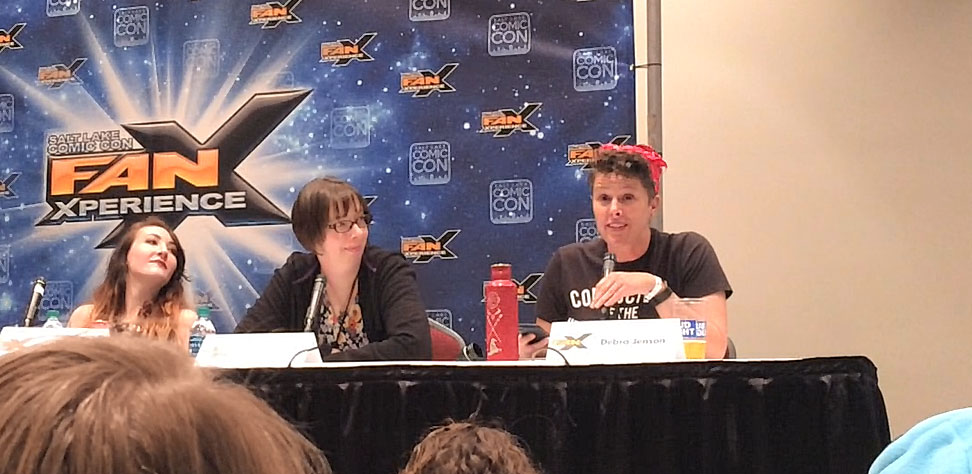USU professor talks about feminism and diversity in media at Salt Lake Comic Con’s FanX
Along with the colorful costumes, the geeky merchandise and the celebrity guests, the Salt Lake Comic Con FanX also featured panels on various topics about media or artistic expression.
Two of these panels were hosted by Utah State University’s Debra Jenson, an assistant professor in the department of journalism and communication. Jenson hosted an 18+ panel on the feminist themes found in the horror movie “The Witch” and a panel about the importance of diversity in media such as movies and comic books.
Other than talking about favorite fandoms such as “Dr. Who” and “Harry Potter,” Jenson said the driving force behind the topics she focuses on in her panels is her belief that media helps people understand who they are, what their place is in the world and what their possibilities are.
“If we don’t see ourselves portrayed in ways that are powerful and intelligent and compassionate and strong and as leaders,” Jensen said, “then we tend to not to see ourselves as that, and other people don’t see us as that.”
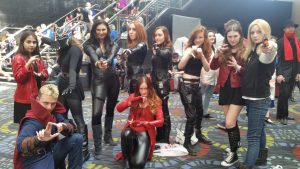
Another reason topics like this are important, Jensen said, was that these conversations can get back to creators and artists who then make work that reflect these ideas. At larger cons, they get back to major creators and more content can hopefully change for the better.
“Comics are for everyone, this is for everyone and my culture is not represented nearly enough in nerdom,” said Michelle Wilde, an Aggie alumnus. “It would be great to see more of it, but bringing it up in venues like this is exactly how we drive that force to create a space for marginalized communities, and so I really appreciate that.”
Wilde is Hispanic and said she loves how Jenson’s panels bring the problematic aspects of nerd culture to light because a lot of people gloss over or ignore them.
“There’s a lot of problems, especially with minorities or feminism or that sort of things within nerd culture and a lot of times people just want to ignore it,” she said, “because it’s not fun and it’s not happy and shiny and rainbows all the time. And it’s something she brings to light and she does it in a fun way so that we can discuss it without getting all ‘Hulk smash’ over the whole thing.”
The main problem when talking about diversity in media, Jenson said, was getting diverse people to talk about these issues on panels. During the first Salt Lake Comic Con in 2013, she went to a similar panel about diversity in comics and found five white men and one black man running the discussion.
Seeing no women, Jenson contacted someone she knew on the programming committee and volunteered to represent her views in future panels. Other panelists joined the discussion later for similar reasons – they felt their voices weren’t represented enough in panels and wanted to get involved.
“I know the staff people who put this part together – the panels together – and they take it very seriously and they desperately want voices of diversity and communities to feel represented,” Jensen said.
But the problem is finding people to join, she said. It’s a small pool of people and it often comes to “Who do you know?”
“And we tend to know people who tend to look like us and live like us,” she said.
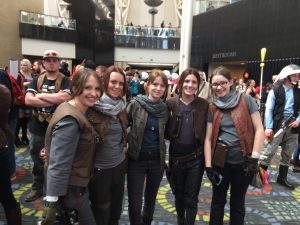
More often than not, efforts to create diversity fall short. Jenson’s panel of six was made up by five white individuals.
“And we fall short in every community that I work in,” she said. “At Utah State, we fall short at panels – I was at a panel about the impact of the 2016 election and it was an all-white panel.”
When Jenson asked, she discovered it came down to the pool of people available to talk about such issues, she said, and it’s difficult in a white-dominant state such as Utah.
“So how do we do it? We try really hard here, and I try really hard and we fail a lot,” she laughed. “And it’s not funny, I mean that laugh is a laugh of sadness. We try, that’s how, we try to reach out to other communities, like I said, I try really hard to put out the word whenever I can.”
Even though her panels weren’t represented by a very diverse group of speakers, Jenson’s daughter Allison said she liked that the panelists still talked about the issues regarding diversity in media and that they acknowledged they were privileged as well as discussed how things could change to increase awareness.
Allison, age 14, said the ideas her mom shares with her has helped shape who she is as a person. She described girls at her school who wore dresses to class every day and were “this very rich, kind of classy kind of girls.”
“Without my mom’s point of view,” she said, “I’d probably be that person at school. Like I wouldn’t stand up for anything and I wouldn’t stand up for myself in classes and stand up for myself against kids who think that it’s okay to touch you when it’s not.”
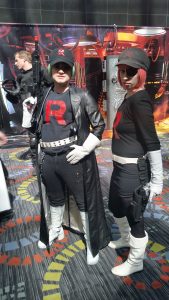
Debra said it is important to understand what it means to grow up with media that represents one community more than others compared to people who don’t grow up with media that looks like them.
“Most of us at Utah State are white, many of us are in heterosexual relationships, we’re cisgendered,” she said. “So most of us have grown up with media that looks like us.”
She encourages others to step outside of themselves and try to see the world through someone else’s eyes.
“Everybody should look for one piece of media that they’re unfamiliar with or that challenges their viewpoint and then they should consume it, and then sit with it and ask themselves how it made them feel and what they can learn from it, and maybe they’ll like it and stick with it,” she said.
Wilde agreed.
“If somebody says ‘hey, have you ever thought about it this way, or that way?,’ rather than shut people down because this was the way it was originally, try and listen,” she said, “try and learn something. Try and have an open mind.”
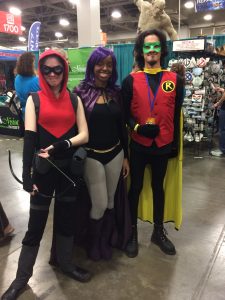
At comic con, she said, anyone can be anything. So, if anyone can be who they want to be at a venue like this, why can’t it be that way in movies, film and literature?
“I love that this is a venue that (Debra)’s fighting to make voices heard and I appreciate that so much,” she said, “because not everybody has that personality. She does a good job at educating.”
– Miranda.lorenc@gmail.com
@miranda_lorenc

